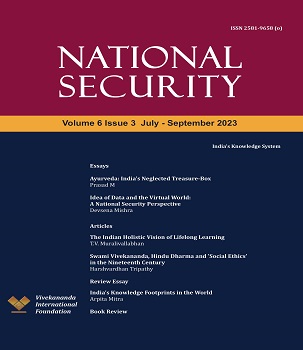About the issue
This issue of National Security explores varied aspects of India’s traditional knowledge system, such as Ayurveda, educational thought and practices, the 19th century debate on ethics between Christian Missionaries and Swami Vivekananda, India’s contributions to world civilisation, and a review of a new book — Science in Sanskrit Scriptures.
Dr. Prasad M in his lead essay explains why Ayurveda is the most sought after traditional system of medicine in the world. He elucidates the basic principles of Ayurveda, its various branches, and its value system that promotes a holistic lifestyle. The essay is a significant introduction to the world of Ayurveda for today’s readers. Devsena Mishra explores the debate around Data, Privacy, and Protection. The author explains that in dealing with the Virtual World, the Bharatiya Approach is starkly different from the Western. Bharat’s Techade, whose goal is to promote human welfare, is critical not just for the country but for the world, she argues.
Dr. T.V. Muralivallabhan focuses on the significance of the traditional Indian model of education for today’s educational systems. The author is confident that many of the problems of the modern period rooted in the scientific and technological revolution and political economy of Western modernity, could largely be alleviated by “using the spirit of the ancient Indian system of education”. Young scholar Harshvardhan Tripathy explores the 19th century debate over social ethics in Hindu religion and Christianity. He discusses Swami Vivekananda’s vital role in both explaining and establishing the centrality of social ethics in Indian philosophy and dharma.
Dr. Arpita Mitra, writes an excellent review essay of the outstanding studies and surveys by eminent historians and Indologists contained in the abridged new edition of India’s Contribution to World Thought and Culture. First published on the occasion of the inauguration of the Vivekananda Rock Memorial in Kanyakumari in 1970, the new shorter edition, she says, will be an invaluable resource that would enhance “our knowledge and understanding about the sphere of influence that India has exerted since time immemorial”. Lastly, Dr. Arvind Gupta reviews the recently published book, Science in Sanskrit Scriptures. The book brings to life the numerous discussions and description of scientific themes in Sanskrit texts from ancient times.
Letters and Comments
Readers can share their views on National Security by e-mail to: the Editor, National Security. E-mail: [email protected]
For more information go through submission guidelines
Editorial Board
International Editorial Advisory Board
CONTENTS: Volume VI Issue III | July - September 2023
Editor’s Note
Revitalising India’s Knowledge System | Sujit Dutta
Essays
Ayurveda: India's Neglected Treasure-Box | Prasad M
Idea of Data and the Virtual World: A National Security Perspective | Devsena Mishra
Articles
The Indian Holistic Vision of Lifelong Learning | T.V. Muralivallabhan
Abstract: The universal principles and practice of any branch of knowledge carries the stamp of the place and time of its origin. Ancient India is the mother of many branches of knowledge. Even the social system that existed here was helpful in attaining information, knowledge, wisdom and enlightenment. The four stages of life and four levels of education were cordially connected to frame a sustainable social system. The Apara Vidya and the Para Vidya that existed in India were holistic and multi-disciplinary in nature. All the problems that have cropped up in the modern period of science and technology could be mitigated to a great extent by using the spirit of the ancient Indian system of education.
Abstract: In nineteenth-century colonial India, Hindu Dharma was attacked by colonial machinery and Christian missionaries for lacking social ethics and morality,with an understanding that Christianity had an ‘inherent and timeless’ social ethic and was concerned with the social upliftment of the poor. This paradigm to criticise Hinduism was also extended to criticise those Hindu intellectuals, especially Swami Vivekananda, who were deliberating over the question of ethics and morality, intending to make Hindu Dharma an agent of social change.These developments in Hindu Dharma were criticised as an outcome of or reaction to Christian social ethics and thereby were declared inauthentic in both colonial and post-colonial periods. By historicising and contextualising the concept of Christian social ethics and morality, this paper debunks the propaganda that concern for the poor and the marginalised was an ‘inherent and timeless’ feature of Christianity.
Review Essay
India's Knowledge Footprints in the World | Arpita Mitra


Post new comment